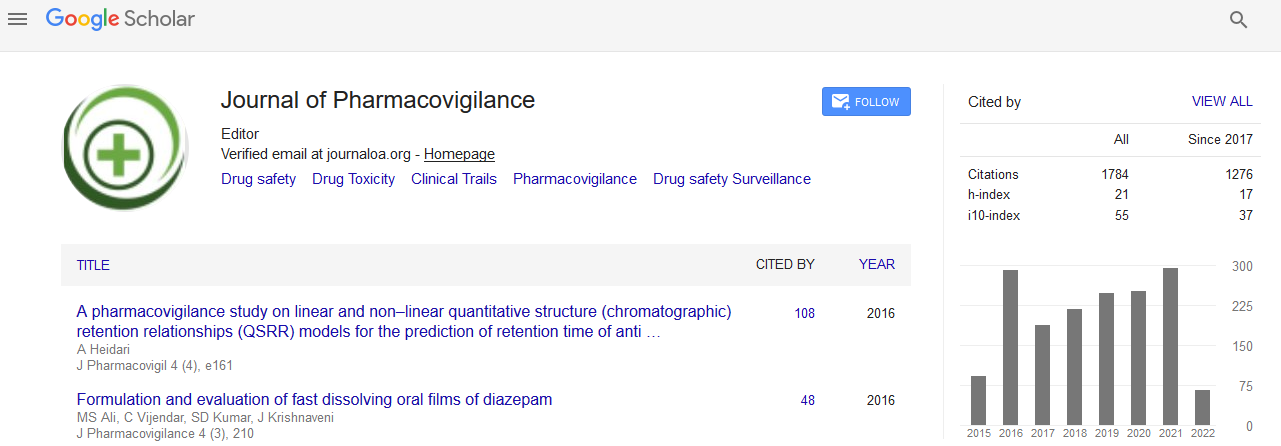Indexed In
- Open J Gate
- JournalTOCs
- The Global Impact Factor (GIF)
- RefSeek
- Hamdard University
- EBSCO A-Z
- OCLC- WorldCat
- Publons
- Euro Pub
- Google Scholar
Useful Links
Share This Page
Journal Flyer

Open Access Journals
- Agri and Aquaculture
- Biochemistry
- Bioinformatics & Systems Biology
- Business & Management
- Chemistry
- Clinical Sciences
- Engineering
- Food & Nutrition
- General Science
- Genetics & Molecular Biology
- Immunology & Microbiology
- Medical Sciences
- Neuroscience & Psychology
- Nursing & Health Care
- Pharmaceutical Sciences
Pharmacovigilance of drugs of Indian system of medicine
3rd International Conference and Exhibition on Pharmacovigilance & Clinical Trials
October 27-29, 2014 Hyderabad International Convention Centre, India
K C Singhal
WorkShop: J Pharmacovigilance
Abstract:
Many indigenous drugs have been described to possess medicinal properties. Virtually all cultures worldwide have relied historically, or continue to rely o medicinal plants for primary healthcare. Traditional herbal medicines constitute a major part of the consumption of therapeutic remedies, often in combination with orthodox medicines. According to WHO, Traditional medicine is the sum total of the knowledge, skills, and practices based on the theories, beliefs and experiences indigenous to different cultures, whether explicable or not used in the maintenance of health as well as in the prevention, diagnosis, improvement or treatment of physical and mental illness. Since there has been relatively little data available in the scientific literature, particularly with regard to the efficacy of plant extracts in controlled clinical trials. Innovative ways of collecting safety information from this kind of practice will have to be initiated. 65 - 80 % of the world population uses traditional medicine as their primary health care. The use of such medicinal plant extracts or concoction for the treatment of various disorders arguably has been based largely on historical and anecdotal evidence. Experience passed on from generation to generation has demonstrated the safety and efficacy of traditional medicine. Thus, pubic has blind faith on traditional medicine. It is a common belief that such drugs are mostly safe and do not cause any harm or side effects. It has been shown that many adverse reactions to herbal remedies remain unnoticed since personal experience is not a reliable basis for the exclusion of uncommon reactions to herbal remedies. While ingestion of alternative medicine, even in overdose, generally produces minimal toxicity, life-threatening events from severe intoxication may also occur. As with other poisonings, an understanding of these agents? mechanism of toxicity is key in planning specific management strategies. ADR analysis thus becomes a challenge and poses even more difficulties in monitoring it. What to say about Traditional Medicine, when allopathic drugs are also difficult to monitor. Doctors are trained generation to generation to ?treat? patients and not to ?monitor ADR?. Traditional drugs pose even a bigger challenge. In many cases, the theories and applications of traditional medicine practices are quite different from those of conventional medicine. Registration trials are nil or grossly inadequate to detect ADRs 1 < 100 - 10,000 patients. There are too many products to monitor. Single and multiple ingredient formulations are numerous. Most of the time, herbal and allopathic drugs are included in the same formulations and are taken together by the same patient. These formulations can be changed at will keeping the same brand name. Methods of preparation of herbs can differ and complicate ADR monitoring of the ?same? herb. Quality checking is ambiguous affecting the causality of an ADR. Moreover, herbal drugs are usually taken Over the Counter by patients and are prescribed by all specialties i.e. Allopathic/ Unani/ Ayurveda/ Homeopathic/ Siddha and RMPSs. Government in most countries has no effective machinery to monitor ADRs. There is no law, which makes it mandatory for doctors to report ADRs. If they report, there is no guarantee of confidentiality of a reported ADR by doctor. Thus scanty information is available. Nobody knows what to see! Population is not educated about ADRs and interprets it as the doctor?s negligence.


